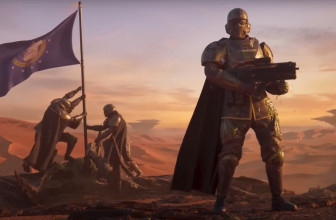
When you stop and think about it, every game is a love affair of sorts, a testament to the individual or collective who poured countless hours into its creation. Even the very worst interactive experiences were, for a time, the focus of someone’s passions and ambitions.
When it comes to the games of Lionhead, one of the UK’s most loved and influential studios, that sentiment rings truer than most. It’s output, from the very best to the least impressive, is infused with a potent sense of humanity and a wit that’s unmistakably rich with Britishness.
Which makes the news of its recent closure all the more painful to accept. We’re not all heartless bastards, so the thought of some very talented, passionate people having their livelihoods threatened is always going to rankle, but there’s a selfish aspect to our very personal response to the news.

A sense of pride
We own the games we play. They become part of our psychological history, informing opinions and frames of reference. They feed our desire to be entertained, to be challenged, to be empowered and made godly for an hour after the kids have gone to bed.
Lionhead games, even the pap ones, offer a unique sense of empowerment and weight, all moulded around a un-anchored moral centre.
Lionhead was an ideas studio – a think tank of curious ideas and concepts, but in a new world of familiar AAA franchises guaranteed to make a sizeable return and low-cost indie games built on a budget, the more obtuse offerings from Lionhead simply weren’t a surefire investment.
And while Lionhead isn’t the only studio to get shuttered by Microsoft (plenty of Kinect-based outfits have also seemingly been put to the sword), it’s loss feels the rawest of all.
Lionhead made games with heart. Games that came packaged with an intrinsic personality that sung with every button press and cutscene. Games that will, sadly, now live on long after the Lionhead sign is taken down outside its offices. One such slice of emotive artistry was Fable 2, and it remains, without a hint of hyperbole, one of the best games ever crafted.
Kickin’ chickens
Like many people that have played a Lionhead game, Fable 2 means something to me. Not a sickly, twee ‘I have a terrible, heart-breaking event in my life and it helped me through’ way, but something more subtle and intrinsic. Fable 2 and I made a connection back in 2008, and like any great love affair, it’s been going strong ever since.

Those reasons it sits so lavishly in my affections aren’t for the reasons you might imagine either. Yes, I was fond of my little pooch, the adorable collie that was bouncy and over-enthusiastic as the breed that I had grown up with as a nipper.
Yes, I felt conflicted by the loss of my on-screen sibling and the terrible decision I had to make in the Spire, all my efforts and time in-game seemingly reduced to a simple choice.
I even felt uncomfortable when I had to choose the fate of the world, and the people I had spent nearly 20 hours protecting (I always play a paragon first, it’s just my thing), standing alone at Smuggler’s Beach, an empty void at my side where a furry friend once wagged his tail with anticipation.
Okay, it was just a dog, but I cared okay? Yes, all of these reasons play a part in Fable 2’s enduring personal legacy, but it was the smaller things, those delicately tuned, finely balanced elements that make a Lionhead game a Lionhead game.
Fabled ingredients
Spending hours (and I mean hours) smithing away in the blacksmiths, playing that sweet spot mini-game over and over again, building that multiplayer so you’re gold can creep up and up.
Using that gold to build the kind of property portfolio you could only dream of in the real world. Did I need to own almost every house, cottage, shop and shack in the land of Albion? Yes, yes I did.

That moment you catch the eye of an NPC in the gender of your choosing, starting the adorably creepy romancing system burned into Fable 2’s social interaction wheel. Offer a gift from your inventory? Blow a kiss? Do a silly dance? Maybe cut a fart that’s blows dangerously close to solid territory? Anything goes on the road to romance.
Wooing said object of affection, proposing with an actual ring (bought with that gold you sweated over in the smithy) and finally getting hitched. Then children (with your name!). Such bliss, your soul finally whole.
Then the game’s grand journey takes you elsewhere. “I’ll be back,” you say with a smile that’s not quite whole. I’ll definitely be back. Definitely.” Then you’re off, gallivanting to Oakfield, Bower Lake and Bloodstone, only to do it all over again in another region. Oh the bigamy.
Surviving the hype
Did all of these features live up to the big claims of the press-charming Peter Molyneux, the front-of-house face of Lionhead for almost two decades? Of course not, but it wouldn’t have been a Molyneux-era Lionhead game without the hyperbolic yet hollow ‘sugar speak’ of the man himself.

The fact Fable 2 was, and is, that good without meeting the overly large promises of its long-standing figurehead for so long is a testament to the passionate game design that Lionhead purveyed so well.
Sure, they tried to make a game for the destined-to-die-from-birth Kinect and it didn’t work (not because the game itself was bad, but because the technology just wasn’t good enough), and even had a go at a multiplayer-only brawler in the cutesy Fable Heroes (not, it wasn’t great either).
And there’s no doubt these charmingly yet ultimately non-financially beneficial outings helped bring about Microsoft’s decision. Fable Legends was another case of the same situation – a studio taking on another genre or subgenre and taking the time to infuse it with that vital sense of charm, self-referential humour and unmistakable Britishness that was Lionhead while simultaneously painting a target on its own back..
In a world of annualised franchises, brutally slim lead times and episodic release schedules, the four years that Fable Legends had spent in development made a brilliant British studio vulnerable. And while we’re all still a little raw from knowing such a titan of home-grown games development has been shuttered, at least we know games such as Fable 2 will keep that unforgettable Lionhead identity young forever more.
Thanks Lionhead, you’ll not be forgotten in a hurry.
Source: techradar.com










































I'll miss them too. The industry is now a less creative and spirited place.